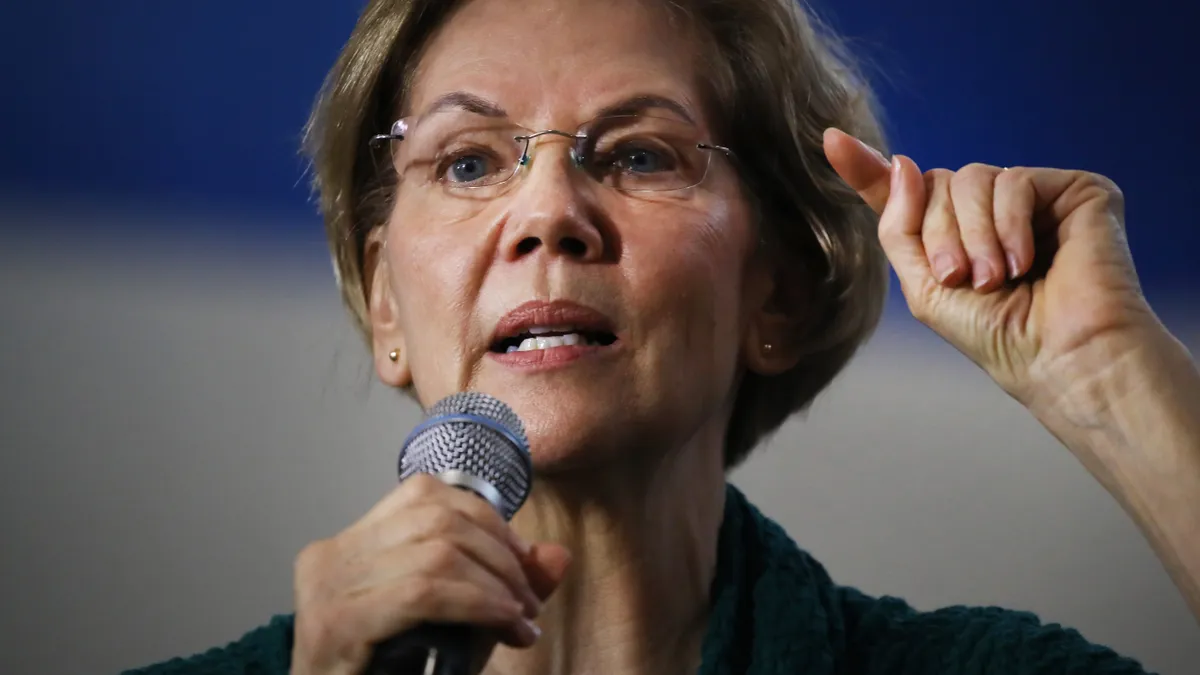Senator Elizabeth Warren continues to train her sights on Wells Fargo CEO Charlie Scharf, who she called “evasive” in a letter published Friday pressing him on the instance of Zelle scams and fraud.
Warren claims Scharf’s reply to her Oct. 6 letter on Zelle issues affecting Wells Fargo customers was “misleading” and that Wells’ customers “deserve better.”
Data shared with her by Scharf and other Wells Fargo executives indicates that customers are reporting Zelle scams and fraud at a rate 2.5 times greater now than they did in 2019, and that the rate of reported scams and fraud is double for Wells’ customers than for customers of other banks.
Warren claims that Scharf’s response was “wholly inadequate given the scope of the problems” and that the bank has failed to deliver data on how frequently it reimburses customers when they fall victim to Zelle fraud or scams.
“Overall, your response reveals that Wells Fargo appears to be unable to protect its customers from fraud and scams, unwilling to come clean about the scope of its problems, and incapable of providing a satisfactory explanation for these failures,” Warren wrote.
Wells Fargo did not return a request for comment by press time. In October, however, a spokesperson told Banking Dive that while Zelle transactions have doubled in three years, 99.94% of customers in 2022 transact without incident, and that they “don’t believe the numbers in a recent report are done on a comparable basis, and therefore the analysis is misleading and inaccurate.”
“We welcome the opportunity to have a constructive discussion about wholistic Zelle data and industry trends — not just that of 3 banks,” the spokesperson said at the time.
The 135,000 instances of Zelle fraud and scams Warren found in her report were compounded from U.S. Bank, PNC Bank, and Bank of America, three of the seven owners of Zelle parent company Early Warning System alongside Truist, JPMorgan, Wells Fargo, and Capital One.
A Zelle spokesperson did not provide further comment Tuesday but backed Wells Fargo up in October, saying that reports of scam and fraud for Wells Fargo customers are “extraordinarily low and comparable to the Zelle Network as a whole, where rates of reported fraud and scams represent less than 0.1% of all transactions.”
Scharf isn’t the only person on Warren’s bad side this past week.
On Monday, Warren wrote a letter to Federal Reserve Chair Jerome Powell, calling the central bank out for two “egregious and embarrassing ethics breaches” amidst a “culture of corruption.”
Two incidents at the Fed, including improper stock trading by Federal Reserve Bank of Atlanta President Raphael Bostic and a meeting between Wall Street investors and St. Louis Reserve Bank President James Bullard, “raise fresh questions about the culture of corruption at the Fed and your unwillingness or inability to address it,” Warren wrote to Powell.
The optics of Bullard’s meeting, which only came to light after a New York Times report, “are terrible,” according to former president of the Federal Reserve Bank of Minneapolis Narayana Kocherlakota, as mentioned by Warren in her letter.
“As Bloomberg’s editorial board writes, ‘[Fed officials] shouldn’t be permitted to share their views on monetary policy in a closed forum, let alone one arranged by a for-profit enterprise the Fed itself is supposed to be regulating.’”
But, as Warren writes, this “does not appear to be an isolated case.” A former employee of the Financial Services Roundtable, which went on to merge with The Clearing House Association to become lobbying group Banking Policy Institute, told The Intercept the Fed officials regularly attend “unreported meetings” where they are “provided ample time to discuss policy with members of the lobbying organization.”
A Fed spokesperson confirmed the central bank received Warren’s letter to Bloomberg but would not provide further comment. Bloomberg reported that the St. Louis Fed said it “would think differently about accepting such invitations in the future,” and Powell has asked the central bank’s inspector general to review Bostic’s disclosures.











